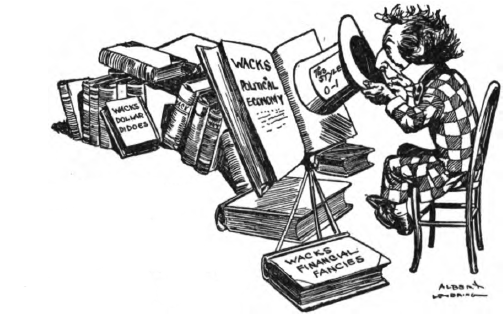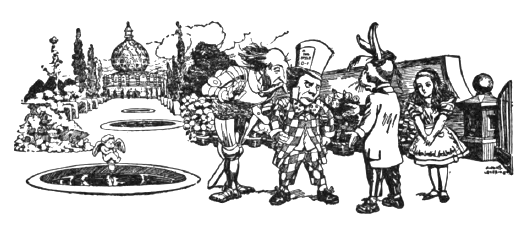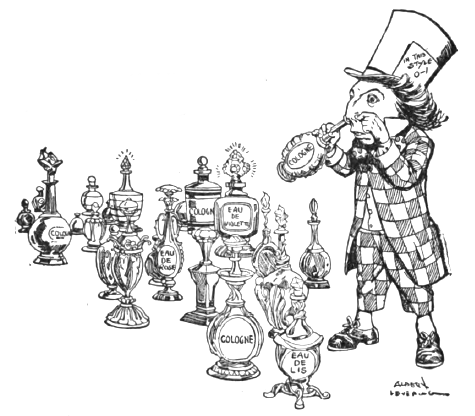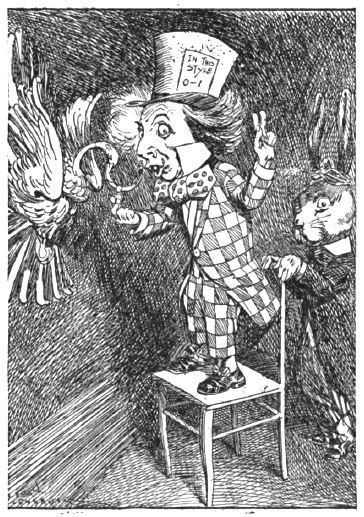| Web and Book design,
Copyright, Kellscraft Studio 1999-2017 (Return to Web Text-ures) |
 (HOME)
|
| CHAPTER III THE AROMATIC GAS PLANT After the little party had descended from the marvellous trolley, concerning which the March Hare observed, most properly, that under private ownership nothing so safe and sane would ever have been thought of, they walked along a beautiful highway, bordered with rosebushes, oleanders and geraniums, until they came to a lovely little park at the entrance to which was a huge sign announcing that within was THE BLUNDERLAND GAS PLANT. To tell the truth Alice had not cared particularly to visit the Gas Works, because she had once been driven through what was known at home as the Gas-House district on her way to the ferry, and her recollections of it were not altogether pleasant. As she recalled it it was in a rather squalid neighbourhood, and the odours emanating from it were not pleasing to what she called her "oil-factories." But here in Blunderland all was different. Instead of the huge ugly retorts rising up out of the ground, surrounded by a quality of air that one could not breathe with comfort, was as beautiful a garden as anyone could wish to wander through, and at its centre there stood a retort, but not one that looked like a great iron skull cap painted red. On the contrary the Municipally Owned retort had architecturally all the classic beauty of a Carnegie Library. "We call it the Retort Courteous," said the Hatter pridefully as he gazed at the structure, and smiled happily as he noted Alice's very evident admiration for it. "You see, in urban affairs, as a mere matter of fitness, we believe in cultivating urbanity, my child, and in consequence everything we do is conceived in a spirit of courtesy. The gas-houses under private ownership have not been what you would call polite. They were almost invariably heavy, rude, staring structures that reared themselves offensively in the public eye, and our first effort was to subliminate— " "Ee-liminate," whispered the March Hare. "I beg your pardon, Mr. Hare," retorted the Hatter. "I did not mean ee-liminate, which means to suppress, but subliminate, which means to sublimify or make sublime. I guess I know my own language." "Excuse me," said the March Hare meekly. "I haven't studied the M. O. Dictionary beyond the letter Q, Mr. Mayor, and I was not aware that the Common Council had as yet passed favourably upon subliminate, either," he added with some feeling. "That is because it was not until yesterday that the Copperation Council decided that subliminate was a constitutional word," said the Hatter sharply. "In view of his report to me, which I wrote myself and therefore know the provisions of, he states that subliminate is a perfectly just and proper word involving no infringement upon the rights of others, and in no wise impairing the value of innocent vested interests, and is therefore legal. Therefore, I shall use it whether the Common Council approves it or not. If they resolve that it is not a good word, I shall veto the resolution. If you don't like it I'll send you your resignation." "That being the case," said the March Hare, "I withdraw my objections." "Which," observed the Hatter triumphantly, turning to Alice, "shows you, my dear young lady, the very great value of the Municipal Ownership idea as applied to the Board of Aldermen. As the White Knight put it in one of his poetical reports printed in Volume 347, of the Copperation Council's Opinions for October, 1906, page 926, "A City may not own its Gas,
Its Barber Shops, or Cars It may not raise Asparagrass, Or run Official Bars; It may not own a big Hotel Or keep a Public Hen, But it will always find it well To own its Aldermen. "When Aldermen were owned by private interests the public interests suffered, but in this town where the City Fathers belong to the City they have to do what the City tells them to, or get out." "It sounds good," was all that Alice could think of to say. "What I was trying to tell you when the Alderman interpolated — " the Hatter went on. "There he goes again!" growled the March Hare. "Was that the first thing we did when we took over the Gas Plant was to sublimify the externals of the works along lines of Architectural and Olfactoreal beauty both to the eye and to the nose, two organs of the human structure that private interests seldom pay much attention to. I asked myself two questions. First, is it necessary for a gas works to be ugly? Second, is it necessary for gas works to be so odourwhifferous that the smell of the Automobile is a dream of fragrant beauty alongside of it? To both these questions the answer was plain. Of course it ain't. Beauty can be applied to the lines of a gas-tank just as readily as to the lines of a hippopotamus, and as for the odours, they are due to the fact that gas as it is now made does not smell pleasantly, but there is no reason why it should not be so manufactured that people would be willing to use it on their handkerchiefs. I learned that Professor Burbank of California had developed a cactus plant that could be used for a sofa cushion — why, I asked myself, could he not develop a gas-plant that will put forth flowers the perfume of which should make that of the violet, and the rose, sink into inoculated desoupitude?" "It hardly seems possible, does it?" said Alice. "To a private mind it presents insuperable difficulties," said the Hatter, "but to a public mind like my own nothing is impossible. If a man can do a seemingly impossible thing with one plant there is no reason why he shouldn't do a seemingly impossible thing with another plant, so I immediately wrote to Professor Burbank offering him a hundred thousand dollars in Blunderland Deferred Debenture Gas Improvement Bonds a year to come here and see what he could do to transmogrify our gas-plant." "Oh, I am so glad," cried Alice delightedly. "I should so love to meet Mr. Burbank and thank him for inventing the coreless apple —— " "You don't means the Corliss Engine, do you?" asked the White Knight. "Well, I'm sorry," said the Hatter, "but Mr. Burbank wouldn't come unless we'd pay him real money, which, although we don't publish the fact broadcast, is not in strict accord with the highest principles of Municipal Ownership. We contend that when people work for the common weal they ought to be satisfied to receive their pay in the common wealth, and under the M. O. system the most common kind of wealth is represented by Bonds. Consequently we wrote again to Mr. Burbank, and expressed our regret that a man of his genius should care more for his own selfish interests than for the public weal, and as a sort of sarcasm on his meanness I enclosed five of our 2963 Guaranteed Extension four per cents to pay for the two-cent stamp he had put upon his letter." "What are the 2963 Guaranteed Extension four per cents?" asked Alice.
 "STUDYING THE ECONOMIC THEORIES OF DR. WACK." "They are sinking fund bonds payable in 2963, only we guarantee to extend the date of payment to 3963 in case the sinking fund has sunk so low we don't feel like paying them in 2963," explained the Hatter. "It's an ingenious financial idea that I got from studying the economic theories of Dr. Wack, Professor of Repudiation and Other Political Economies at the Wack Business College at Squantumville, Florida. It is the only economic theory I know of that absolutely prevents debt from becoming a burden. But that aside, when Mr. Burbank showed that he preferred fooling with such futile things as pineapples and hollyhocks, to the really uplifting work of providing the people with gas that was redolent of the spices of Araby, I resolved to do the thing myself." "He is a man of real inventive genius," said the March Hare, anxious, apparently, to square himself with the Hatter again. "Thank you, Alderman," said the Hatter. "It is a real pleasure to find myself strictly in accord with your views once more. But to resume, Miss Alice — as I say I resolved to tackle the problem myself." "Fine," said Alice. "So you went in and studied how to make gas the old way and then——" "Not at all," interrupted the Hatter. "Not at all. That would have been fatal. I found that everybody who knew how to make gas the old way said the thing was impossible. Hence, I reasoned, the man who will find it possible must be somebody who never knew anything about the old way of making gas, and nobody in the whole world knew less about it than I. Manifestly then I became the chosen instrument to work the reform, so I plunged in and you really can't imagine how easy it all turned out. I had no old prejudices in gas-making to overcome, no set, finicky ideas to serve as obstacles to progress, and inside of a week I had it. I filled the gas tanks half full of cologne, and then pumped hot air through them until they were chock full. I figured it out that cologne was nothing more than alcohol flavoured with axiomatic oils——" "Aromatic," interrupted the March Hare, forgetting himself for the moment.
 "THE WHITE KNIGHT INTERFERED" The Hatter frowned heavily upon the Alderman, and there is no telling what would have happened had not the White Knight interfered to protect the offender. "It's still an open question, Mr. Mayor," he observed, "if axiomatic applied to a scent is constitutional. If an odour should become axiomatic we could never get rid of it you see, and I think the Alderman has distinguished authority for his correction, which——" "O very well," said the Hatter. "Let it go. I prefer axiomatic, but the private predilections of an official should not be permitted to influence his official actions. I intend always to operate within the limits of the law, so if the law says aromatic, aromatic be it. I figured that cologne was nothing more than alcohol flavoured with aromatic oils, and that inasmuch as both alcohol and oil burn readily, there was no reason why hot air passed through them should not burn also, and carry oil some of the aroma as well." "It certainly was a very pretty idea," said Alice. "All the M. O. ideas are pretty," said the March Hare. "It is only the question of reducing beauty to the basis of practical utility that confronts us." "And how did it work?" asked Alice, very much interested.
 "IN THE MATTER OF PERFUME IT WAS FINE" "Beautifully," said the Hatter. "Only it wouldn't burn — just why I haven't been able to find out. But in the matter of perfume it was fine. People who turned on their jets the first night soon found their houses smelling like bowers of roses, and a great many of them liked it so much that they turned on every jet in the house, and left them turned on all day, so that in the mere matter of consumption twice as much of my aromatic illuminating air was used in a week as the companies had charged for under the old system, and we used the same metres, too. In addition to this, as a mere life-saving device, my invention proved to have a wonderful value. In the first place nobody could blow it out and be found gas-fixturated the next morning——"
 "NOBODY COULD BE GAS-FIXTURATED" "Good word that — so much more expressive than the old privately owned dictionary word asphyxiated," said the March Hare. The Hatter nodded his appreciation of the March Hare's compliment, and admitted him once more to his good graces. "And nobody could commit suicide with it the way they used to do with the old kind of gas, because, you see, it was, after all, only hot air, which is good for the lungs whichever way it's going, in or out. We use hot air all the time in our Administration and it is wonderful what results you can get from it," he went on. "But it wouldn't light. In fact when anybody tried to light it, such was the pressure, it blew out the match, which I regard, as an additional point in its favour. If we have gas that blows out matches the minute the match is applied to it, does not that reduce the chance of fire from the careless habit some people have of throwing lighted matches into the waste-basket?" "It most certainly does," said the White Knight gravely, and in such tones of finality that Alice did not venture to dispute his assertion. "We're all agreed upon that point," said the Hatter. "But there were complaints of course. Some people, mostly capitalists who were rich enough to have libraries of their own, complained that they couldn't read nights because the gas wouldn't light. I replied that if they wanted to read they could go to the Public Library, where there were oil lamps, and electric lights. Besides reading at night is bad for the eyes. Others objected that they couldn't see to go to bed. The answer to that was simple enough. People don't need to see to go to bed. They may need to see when they are dressing in the morning, but when they go to bed all they have to do is to take their clothes off and go, and I added that people who didn't know enough to do that had better have nurses. Finally some of the chief kickers got up a mass-meeting and protested that the new gas wasn't gas at all, and in view of that fact refused to pay their gas tax." "Oho!" said Alice. "That was pretty serious I should think." "It seemed so at first," said the Hatter, "but just then the beauty of the Municipal Ownership scheme stepped in. I called a special meeting of the Common Council and they settled the question once for all." "Good!" cried Alice "How did they do it?" "They passed a resolution," said the Hatter, "unanimously declaring the aromatic hot-air to be gas of the most excellent quality, and made it a misdemeanor for anybody to say that it wasn't. I signed the ordinance and from that minute on our gas was gas by law." "Still," said Alice, "those people had already said it wasn't. Did they back down?" "Most of 'em did," laughed the Hatter. "And the rest were fined $500 apiece and sent to jail for six months. You see we made the law sufficiently retroactive to grab the whole bunch. Since then there have been no complaints." Whereupon the Hatter invited Alice to stroll through the gas-plant with him, which the little girl did, and declared it later to have been sweeter than a walk through a rose-garden, which causes me to believe that the Mayor's scheme was a pretty wonderful one after all, and quite worthy of a Hatter thrust by the vagaries of politics into the difficult business of gas making. |